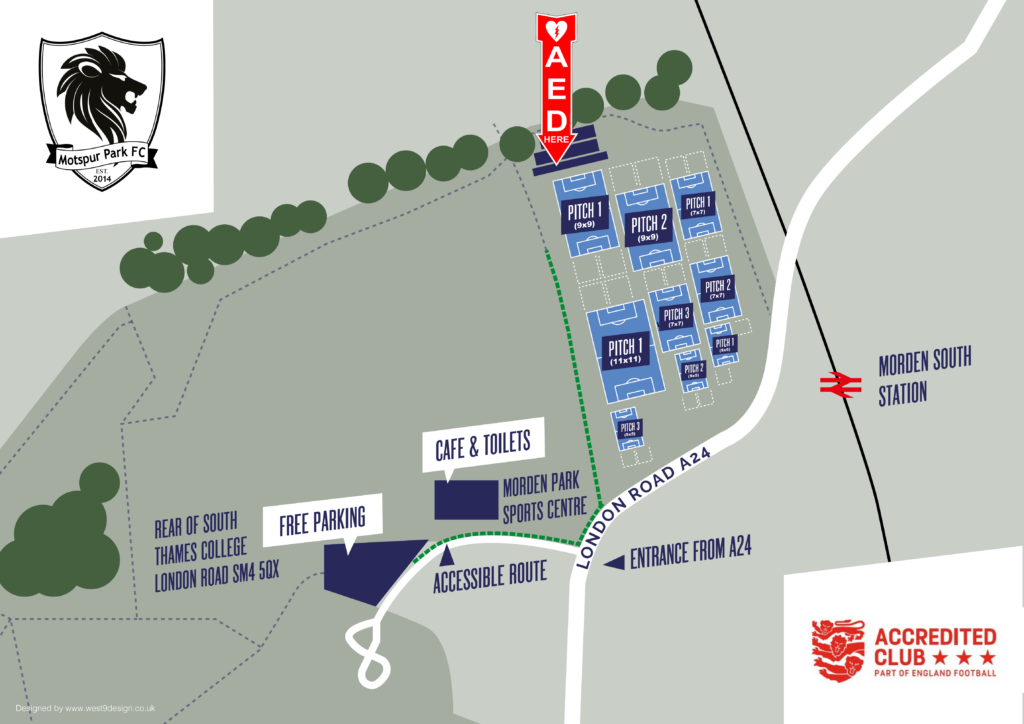Morden Sports Ground is a local authority site maintained by volunteers from Motspur Park Community Football Club for the benefit of the local community. We are responsible for the sites upkeep and this page details the maintenance operations that we carry out and their purpose.
All of our groundskeepers have obtained at least a Level 1 Qualification in Maintaining Winter Sports Pitches from the Grounds Management Association (GMA, formerly the Institute of Groundsmanship). In addition, all of our machinery operators have a nationally recognised qualification (LANTRA) in the respective area with the appropriate competency modules completed.
Site Layout
If you’re visiting Morden Sports Ground you can park in Morden Park Car Park (SM4 5QU). The car park is free on Sundays and on Saturdays after 13:00. Alternatively, the venue is easily accessible through numerous public transport links (tube, rail, bus, and even tram if you don’t mind a short walk).
MSG is the home for all of our Mini-Soccer teams with three 5-aside and three 7-aside pitches as well as the primary home ground of our 9-aside teams. We also have an 11-aside pitch. Each pitch has an allocated training area shown on the map above which must be observed by the home and visiting teams. All warm ups must take place off of the pitch to preserve the playing surface.
Contact Details
Contact our team of volunteers groundskeepers!
Telephone: 020 8611 2049
Email: mordensportsground@motspurparkcfc.com
Hire a Pitch
If you want to hire one of our pitches please email your requirements to pitchhire@motspurparkcfc.com and one of our team will get back to you. Please note that we do not mark football pitches out during the off-season (Mid May-July) and we therefore require at least 7 days notice to mark out pitches during this period.
More Information Coming Soon:
- Pitch Hire Prices
- Pitch Hire Agreement
Pitch Maintenance Operations
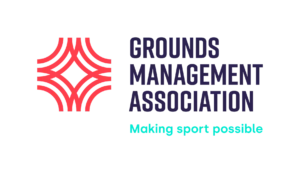
We perform a number of maintenance operations in accordance with advice from the Grounds Management Association (GMA, formerly the Institute of Groundsmanship) with generous financial support from the Football Foundation. These operations are carefully planned to ensure that we are using resources appropriately and always consider the environmental impact of our work.
We regularly assess our pitches against the Performance Quality Standards Framework (PQS) which comprises of structural, presentational, and performance components. This allows us to identify the individual performance standards that need improving so that our maintenance regime can be tailored appropriately. A selection of the maintenance operations we perform are listed below:
Mowing
We use a Wessex RMX-620 mower to cut the sports field and a Wessex CRX-180 for smaller tasks or when the field is too wet for a heavier vehicle. We aim to maintain a 30mm cutting height during the playing season but we may increase this during times of drought or to protect the playing surface during the wetter winter months. When the grass is actively growing we cut the field at least once a week to encourage a dense sward and prevent a build up of organic material. In times of excessive growth we often need to cut two to three times a week!


Line Marking


Our resident groundsman Rikki is chief line marker. Perfectly straight lines every time! We make sure to use paint that is biodegradable and safe for the environment. Our lines are marked fresh once a week ready for the weekends fixtures. Sometimes we even turn up to fanciful designs. Keep an eye out when big events are happening…
Surface Grooming & Brushing
Our most versatile, and used, piece of kit is the SISIS Quadraplay with four height adjustable implements it can perform a variety of tasks in a single pass!
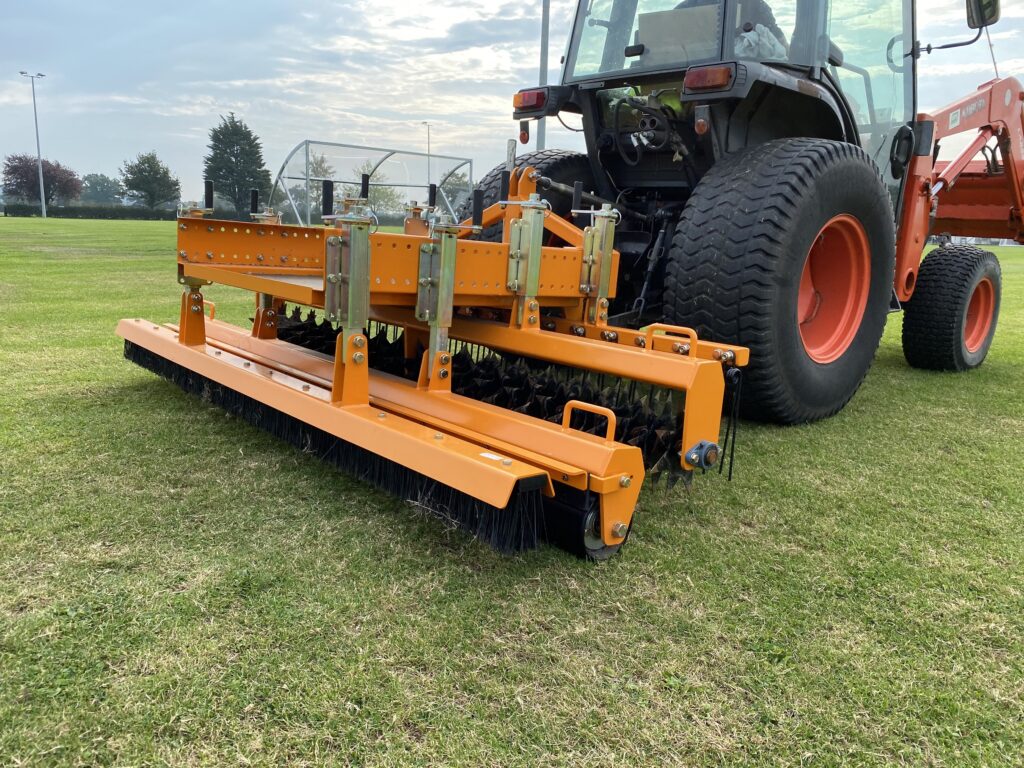
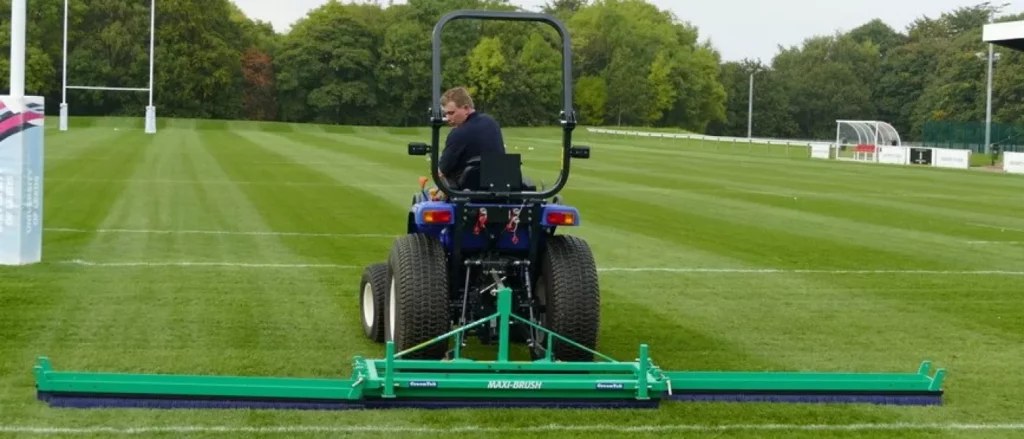
The Quadraplay is equipped with a spring tine rake, star slitter, roller, and brush meaning that it can perform shallow aeration, remove thatch (decaying organic matter), stripe the pitches, and gently level the surface. We often use it before or after games to tidy up the playing surface. We also have a Greentek MaxiBrush which is used prior to mowing to get the grass to stand up, remove worm-casts and disperse dew, thus helping to prevent fungal diseases such as fusarium.
Aeration
We perform two types of aeration (linear and solid tine) to help decompact the playing surface – a common problem on clay soils! Because our pitches are on heavy clay we need to make sure that we are selecting the right equipment and timing these operations carefully to prevent damage. That’s why we use a Verti-Drain 7626, a SISIS Quadraplay, and a linear slitter at appropriate times throughout the year. We specifically do not use a disc slitter as the continuous slits are prone to cracking on clay soils during hot weather!
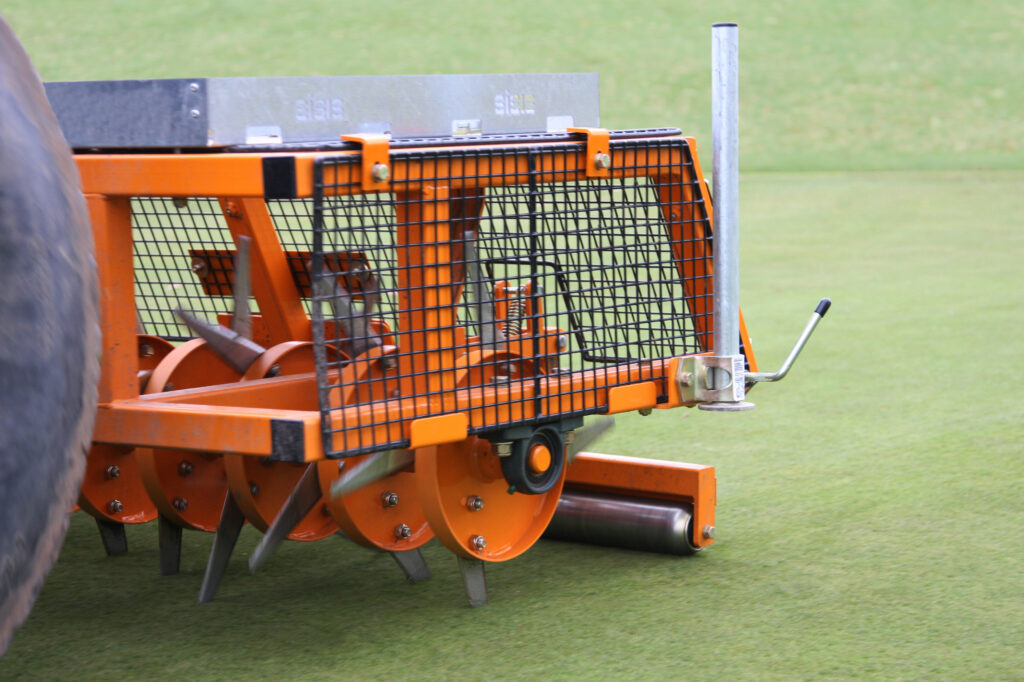
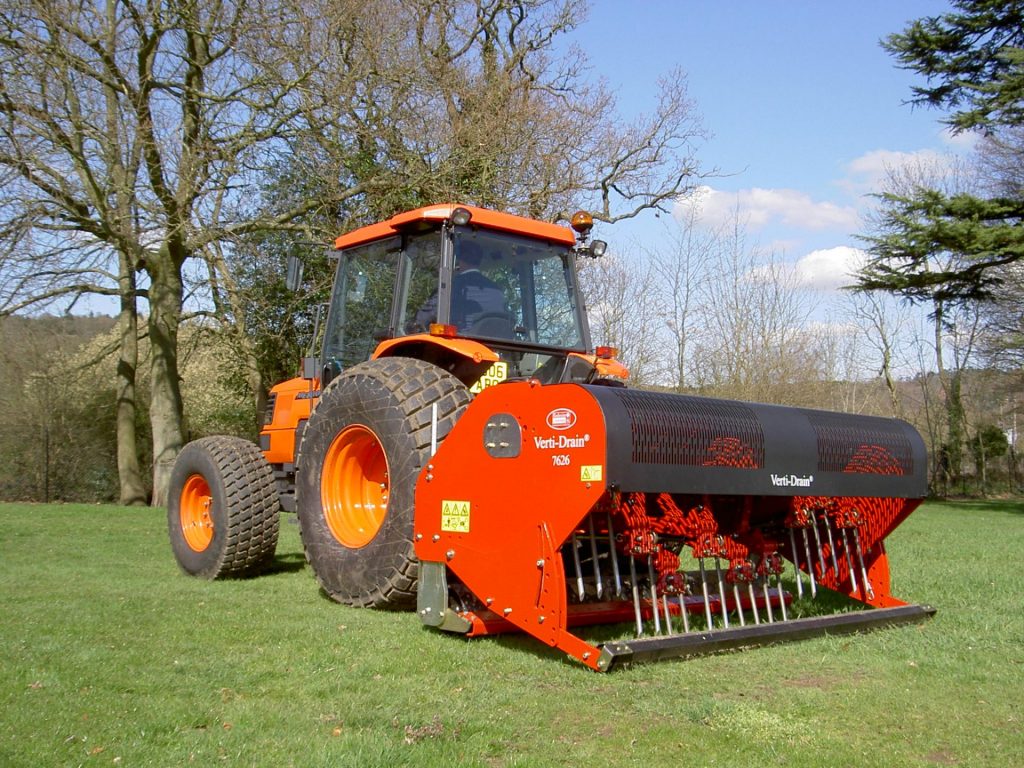
The benefits of performing aeration to the surface are:
- Relieving compaction and improving surface conditions
- Better penetration of water, air and fertiliser straight to rootzone
- Improving soil structure and rooting capacity
- Increasing carrying (playing) capacity
- Releases toxic gases from the soil
- Increased shoot growth
Did you know it is thought to be the most important groundskeeping technique in reducing player injury?
Topdressing
Topdressing is the application of materials onto the playing surface. For winter turf pitches this is often a sports sand which is a specialist sub-angular (ball shaped) sand where the particles are of a similar size to prevent compaction or capping, or a mixture of sports sand and topsoil. We use a 9:1 mix of sports sand and topsoil respectively.
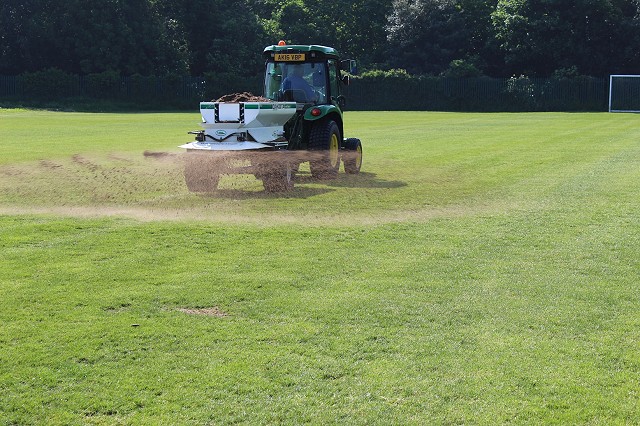
Due to cost constraints we usually only apply topdressing locally to raise and even out the surface level at the place of application. However, if we are doing extensive work topdressing may be applied across a larger area, such as a goalmouth, or even the entire pitch! It is important that topdressing is worked into the surface through brushing to avoid any grass being smothered, and to ensure that it is applied evenly.
Overseeding
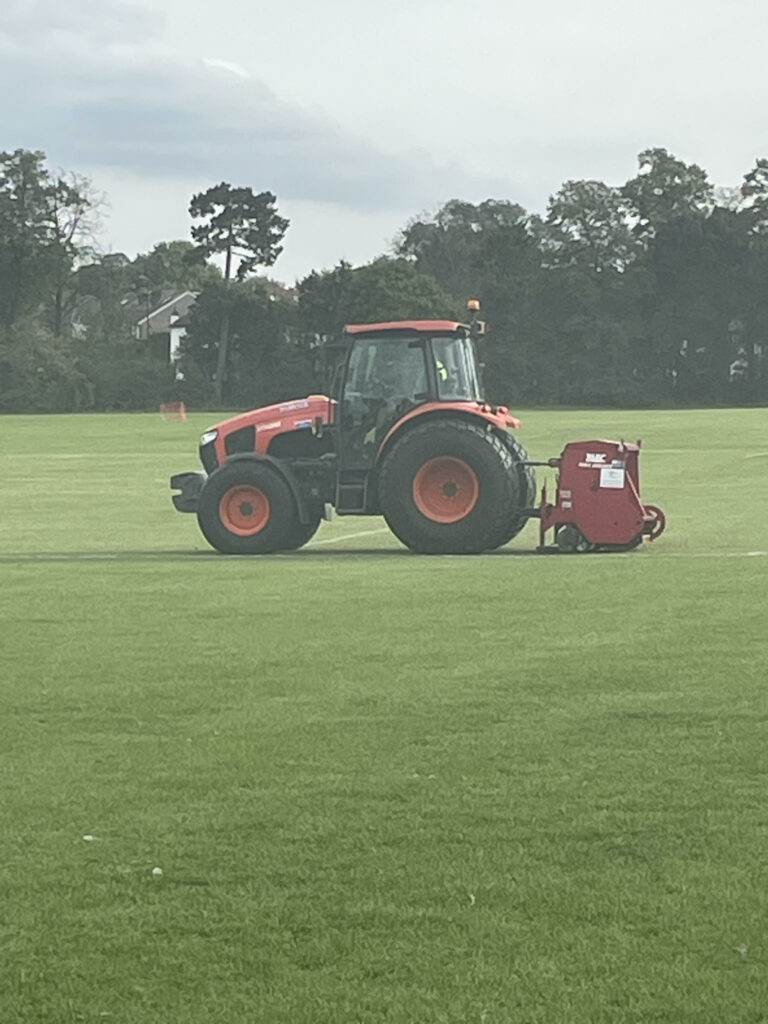
We perform overseeding at least once a year; the optimal times for seeding are when the conditions are warm and wet promoting grass growth. Overseeding is just a fancy name for planting more grass we do this to:
- Increase the grass plant density in a worn or thin areas (usually goal mouths and the centre circle!)
- Reduce the proportion of less suitable grass in the sward by increasing the proportion of sport-specific grass species
We use a blend of perennial rye grasses which contain tetraploid species. These species of grass establish quicker and are deeper rooting meaning that they are more durable to environmental stressors and people playing football!
Sometimes you may see large black sheets pegged down on the field. These are germination sheets and they help promote grass growth by increasing the soil temperature and preventing moisture from evaporating.
Weed Management
Managing weeds is an important part of our job and this is not purely for aesthetic reasons! Broadleaf weeds are less durable than perennial ryegrass (the species of grass we sow on our pitches) which means they get kicked out through play easily. This results in bare patches which become sodden in the winter and dry and crack in the summer. Keeping weeds at bay is important in maintaining pitch safety, playability, and surface durability.
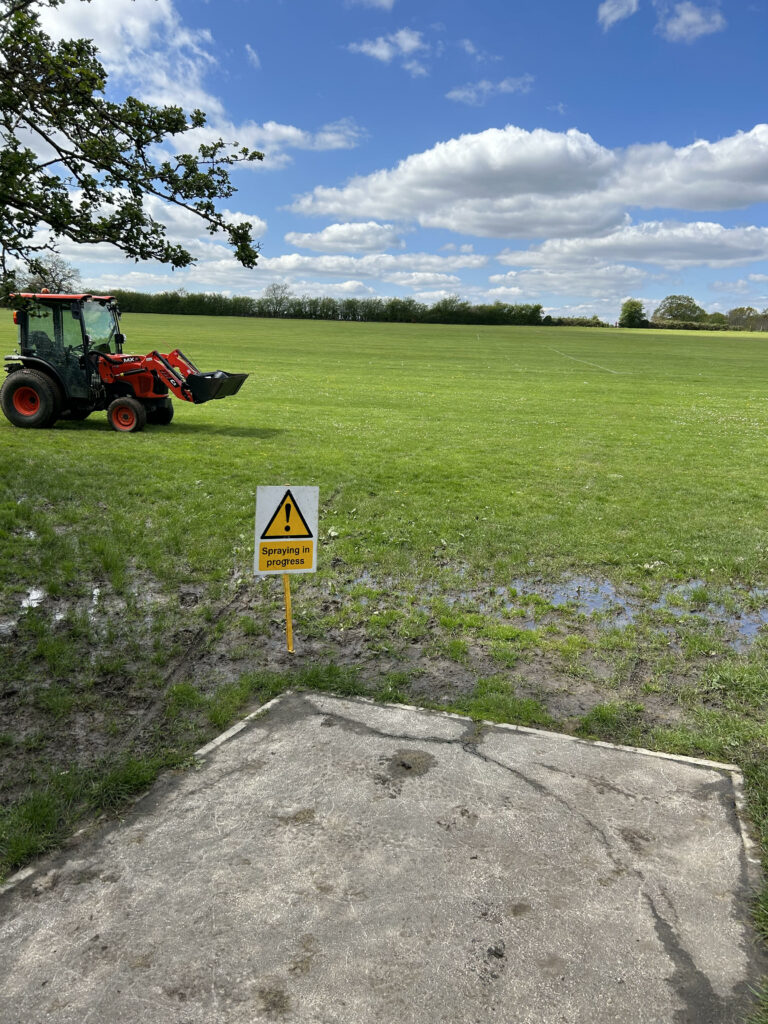
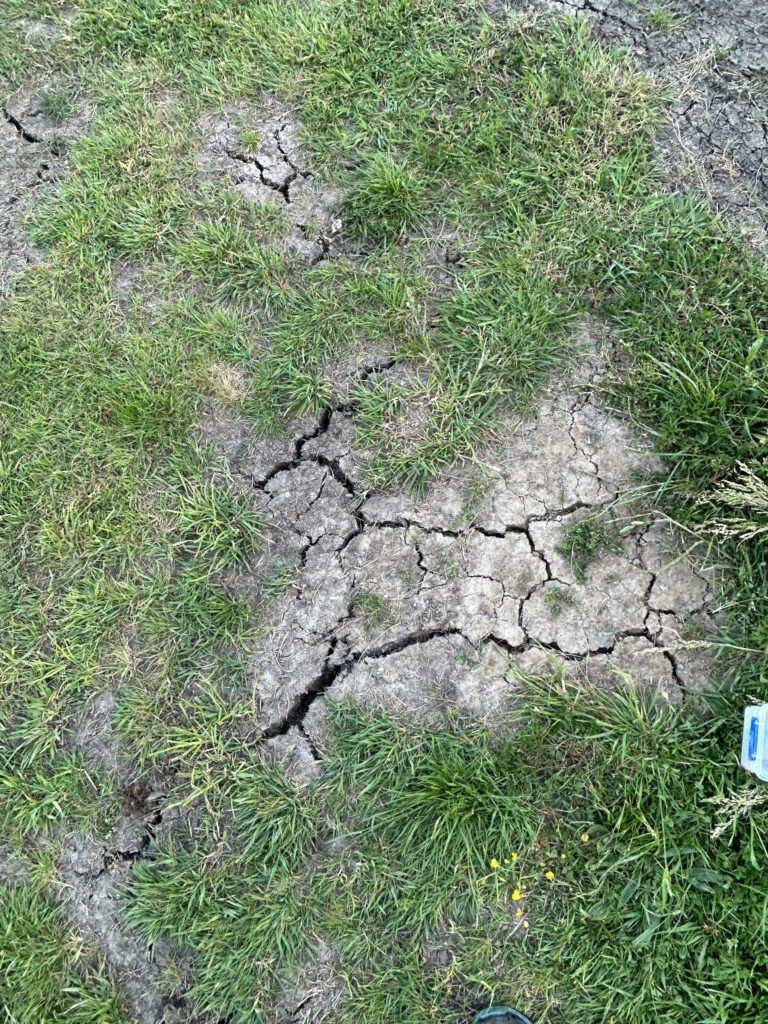
Weeds are also a good indicator as to other problems; for example, broadleaf plantains thrive on heavily compacted soils whereas clover is common in soils deficient in nutrients, especially nitrogen, meaning they tend to proliferate during drought when grass becomes stressed and clovers can outcompete easily!
Our primary method for managing weeds is through cultural practices such as:
🌿 Maintaining a dense grass sward with suitable grass species
🌿 Maintaining appropriate mowing heights
🌿 Adequate fertiliser application
🌿 Surface grooming
🌿 Surface aeration and soil decompaction
In some cases we may need to apply a selective herbicide to the pitches to remove weeds. This is planned carefully and performed by an accredited contractor. We only use chemicals that are safe for public amenity spaces and are of a non-toxic, non-flammable and non-corrosive nature making them safe for children and pets!
Application of Fertiliser
When grass does not have sufficient nutrients (food) to grow it exhibits slow growth, poor recovery after damage, and unsightly grass plants. A lack of nutrients can therefore be problematic for sports pitches where you need the grass plants to recover quickly after use ready for the next match!
Grass needs three main nutrients to grow, these are Nitrogen, Phosphorus, and Potassium. We use a fertiliser on our pitches which contains these elements to help promote healthy growth. Fertiliser applications are managed carefully through regular soil analyses to ensure that it is not overapplied as this can lead to soft weak grass which will damage and wear easily and won’t repair well. We contract a company to apply a liquid fertiliser to the pitches which is calculated and output by a computer controlled sprayer to ensure a consistent and even coverage.
Generic Grounds Maintenance Operations
Coming Soon!
- Litter Picking
- Cleaning and Edging of Pathways
- Clearing of Leaves and Debris
- … More Coming Soon …
